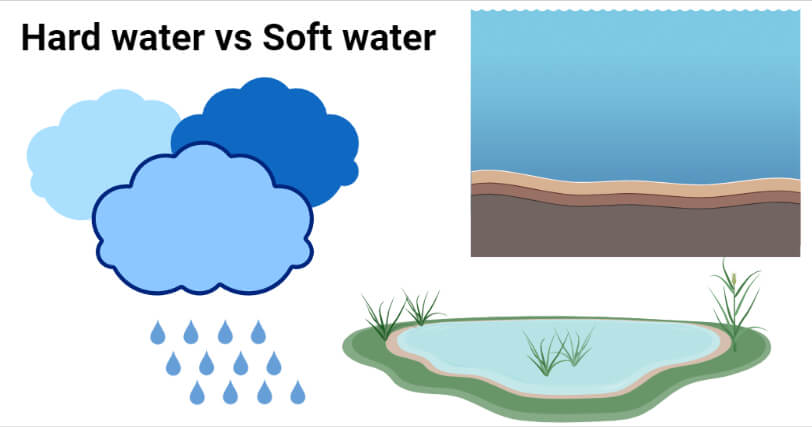Hard Water Definition
Hard water is the water with a high mineral content which is formed by the percolation of water through deposits of mineral rocks like limestone.
- Hard water contains chemical ions like bicarbonates, carbonates, and sulfates of calcium and magnesium.
- Some hard water might also contain iron oxides or iron carbonates resulting in a reddish-brown coloration to the deposits.
- Hard water is considered better for the health as it provides moderate health benefits, but it might pose problems in industrial settings as it requires purifiers in order to remove excess chemicals.
- The detection of hard water can be done domestically by the lack of foam formation while using soap agitated in water or by the formation of scales on kettles and water heaters.
- Hard water is formed by the movement of rainwater, which has a low concentration of multivalent ions, through beds of rocks. The degree of hardness, thus, depends on the varying complexity of the geology of a place.
- Hardness can be classified into two types; permanent hardness and temporary hardness.
- Permanent hardness is the type of hardness caused by the presence of multivalent cations (mostly with the charge +2) like calcium and magnesium and anions like sulfate and chloride.
- Temporary hardness is the type of hardness caused by the presence of dissolved bicarbonates and carbonates, which can be reduced by various means.
- Permanent hardness is difficult to remove by simple methods like boiling as the sulfates and chlorides do not precipitate out with the increase in temperature.
- Hard water might result in problems like clogging plumbing, deposits on utensils as well as galvanic corrosion.

Soft Water Definition
Soft water is the water that is free from dissolved salts of calcium and magnesium and thus has low mineral content.
- Soft water contains minerals of monovalent cations like sodium; instead, the multivalent cations found in hard water.
- Soft water is usually produced by treating hard water with water softeners or other agents that decrease the mineral content of the water.
- Soft water is essential for cleaning and washing purposes as it produces sufficient lather with soap.
- Softening of water has been practiced for water from different sources as the mineral content can be highly high for general purposes.
- It is also considered better for increasing the lifetime of plumbing by reducing the scale build-up in pipes.
- Common softening agents used for the process include lime and ion-exchange resin, which exchange the minerals to produce soft water.
- Since the salts present in soft water is of sodium ions, the water has a salty taste.
- Soft water can eventually turn into hard water if the water comes in contact with mineral rocks for a prolonged period of time.
9 Major Differences (Hard water vs Soft water)
| Characteristics | Hard Water | Soft Water |
| Definition | Hard water is the water with a high mineral content which is formed by the percolation of water through deposits of mineral rocks like limestone. | Soft water is the water that is free from dissolved salts of calcium and magnesium and thus has low mineral content. |
| Minerals | Hard water contains sulfates, carbonates, chlorides, and bicarbonates of calcium and magnesium. | Soft water contains salts of sodium. |
| Taste | Hard water usually has a characteristic taste depending on the type of mineral present. | Soft water usually tastes salty. |
| Produced | Hard water is formed by the percolation of water through mineral rocks. | Soft water is produced by the treatment of hard water with softeners. |
| Foam formation | Hard water produces a film instead of foam in the presence of soap agitated in water. | Soft water produces plenty of foam in the presence of soap agitated in water. |
| Uses | Hard water has moderate health benefits as it provides minerals to the body. | Very soft water is considered unsuitable for drinking. |
| Hard water might result in problems in plumbing. | Soft water is effective for cleaning as it produced plenty of foam. | |
| Scaling | Hard water leaves scales and spots on the dishes after drying. | Soft water doesn’t leave scales or spots on dishes. |
| Examples | Groundwater is an example of hard water. | Rainwater is an example of soft water. |
Example of Hard Water
Groundwater
- Groundwater is the water present underneath the Earth’s surface, usually distributed in soil pore spaces and cracks in rocks.
- Water under the surface remains in the form of a water table depending on the depth of soil pore spaces and fractures in rocks.
- The source of groundwater is surface water, where the water discharges from springs and other sources seep through the openings.
- Water might also be withdrawn from agricultural lands, waste discharge, and industrial operations.
- Groundwater is often cheaper and less polluted than surface water and is used for consumption. Many countries throughout the world depend entirely on groundwater for municipal water supplies.
- As groundwater remain in close contact with rocks while passing through and lying on them, the water is hard and contains a different type of salts.
- Groundwater can have both permanent as well as temporary hardness depending on the position and geology of the area.
Example of Soft Water
Rainwater
- Rainwater is the water dropping in the form of droplets that have condensed from the atmospheric vapor.
- Rainwater is an essential part of the water cycle on Earth and is responsible for most of the water on the surface of the planet.
- It is a mixed electrolyte composed of varying concentrations of major and minor ions. The composition of rainwater varies from place to place and from season to season.
- The major ions found in rainwater are sodium and potassium and their chlorides, whereas the minor ions include nitrates, iron, and silica.
- Rainwater is soft water as it contains minimal mineral content. It is, thus, considered healthy for consumption.
- Rainwater is, however, effective for washing and cleaning purposes as it produces sufficient lather with soap.
References and Sources
- Sengupta, Pallav. “Potential health impacts of hard water.” International journal of preventive medicine vol. 4,8 (2013): 866-75.
- Leurs, Lina J et al. “Relationship between tap water hardness, magnesium, and calcium concentration and mortality due to ischemic heart disease or stroke in The Netherlands.” Environmental health perspectives vol. 118,3 (2010): 414-20. doi:10.1289/ehp.0900782
- https://en.wikipedia.org/wiki/Hard_water
- https://pediaa.com/difference-between-hard-water-and-soft-water/
- https://en.wikipedia.org/wiki/Groundwater_regulation
- https://blog.oureducation.in/softening-of-water-by-various-methods/
- https://www.bestrowaterpurifier.in/blog/what-is-hard-water-pros-cons/
- https://pubs.usgs.gov/wsp/1535g/report.pdf
- http://attemptnwin.com/answers/rain-water-consists/
- https://byjus.com/jee/hardness-of-water-types-and-removal/

Your information was very helpful. thank you
Thnx guyz 4 da notes
That was so nice